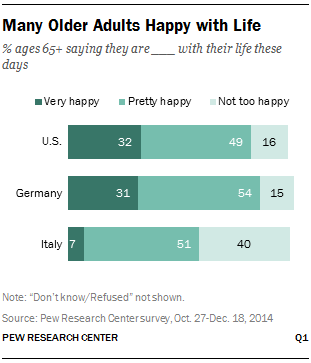 Aging adults in the U.S., Germany and Italy are generally happy with their lives, and many see upsides to getting older. For example, in each of the three countries, more than six-in-ten adults ages 65 and older say they are spending more time with their family and on hobbies and other interests as they get older, and about half or more also say they are experiencing less stress.11
Aging adults in the U.S., Germany and Italy are generally happy with their lives, and many see upsides to getting older. For example, in each of the three countries, more than six-in-ten adults ages 65 and older say they are spending more time with their family and on hobbies and other interests as they get older, and about half or more also say they are experiencing less stress.11
But for some, especially in Italy, aging comes with challenges. In particular, older Italians are more likely than their American and German counterparts to say physical limitations, loss of memory or other mental capabilities and sadness or depression are currently major problems for them. They are also less likely than older Americans and Germans to be very satisfied with some key aspects of life, including the quality of life in their community, the number of friends they have, their housing situation and their family life.12
Older Italians are also generally less happy with their lives than older Americans and Germans. Some 81% of Americans and 84% of Germans ages 65 and older say they are at least pretty happy, including about three-in-ten who say they are very happy (32% and 31%, respectively). By contrast, a much narrower majority of older Italians (58%) express some happiness, with just 7% saying they are very happy with the way things are going for them.
The survey also finds that older adults in these countries are not especially dependent on their children. While many older adults in the U.S., Germany and Italy have received help from their children with errands, housework or home repairs in the 12 months preceding the survey, fewer than one-in-five say they have received financial help or help with personal care, such as bathing or getting dressed. And they don’t necessarily need it. At least eight-in-ten aging adults in all three countries surveyed say they can handle their affairs and care for themselves without help.
Satisfaction with Key Aspects of Life
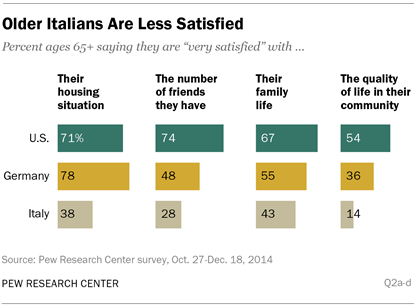 Overall, older adults in the three countries surveyed are about as satisfied as younger adults with key aspects of life, but in Germany and the U.S., those in older age groups are more likely to express high levels of satisfaction with their housing situation. Solid majorities of Germans (78%) and Americans (71%) ages 65 and older say they are very satisfied with this aspect of their life, a sentiment they share with most respondents ages 50 to 64 (71% in Germany and 66% in the U.S.). By contrast, only about half of those in younger age groups in the two countries express similarly high levels of satisfaction with their housing situation (52% of those ages 18 to 29 and 54% of those 30 to 49 in Germany and 48% and 53%, respectively, in the U.S.). In Italy, relatively few across age groups say they are very satisfied with their housing situation. About four-in-ten (38%) Italians ages 65 and older – and about as many in younger age groups – say this is the case.
Overall, older adults in the three countries surveyed are about as satisfied as younger adults with key aspects of life, but in Germany and the U.S., those in older age groups are more likely to express high levels of satisfaction with their housing situation. Solid majorities of Germans (78%) and Americans (71%) ages 65 and older say they are very satisfied with this aspect of their life, a sentiment they share with most respondents ages 50 to 64 (71% in Germany and 66% in the U.S.). By contrast, only about half of those in younger age groups in the two countries express similarly high levels of satisfaction with their housing situation (52% of those ages 18 to 29 and 54% of those 30 to 49 in Germany and 48% and 53%, respectively, in the U.S.). In Italy, relatively few across age groups say they are very satisfied with their housing situation. About four-in-ten (38%) Italians ages 65 and older – and about as many in younger age groups – say this is the case.
Older Americans and Germans are also more likely than their Italian counterparts to express high levels of satisfaction with their family life. Two-thirds of American adults ages 65 and older and 55% of Germans in the same age group say they are very satisfied, compared with 43% of Italians.
In all three countries, high levels of satisfaction with family life are far more common among older adults who are married than among those who are not. The difference is particularly pronounced in Germany and Italy, where married adults ages 65 and older are nearly twice as likely as older adults who are not married to say they are very satisfied with their family life (70% vs. 35% in Germany and 50% vs. 26% in Italy). In the U.S., 79% of married adults ages 65 and older say they are very satisfied with their family life, compared with 57% of those who are not married.
When it comes to the number of friends they have, older Americans are far more satisfied than older Italians or Germans. Nearly three-quarters (74%) of older Americans are very satisfied with the number of friends they have, compared with about half of Germans (48%) and only 28% of Italians in the same age group.
Across the three countries, respondents ages 65 and older express lower levels of satisfaction with the quality of life in their community than with their housing situation, family life or the number of friendships they have. In the U.S., 54% of older adults say they are very satisfied with the quality of life in their community. More than one-third of older adults in Germany (36%) and only 14% in Italy say the same.
Household Finances
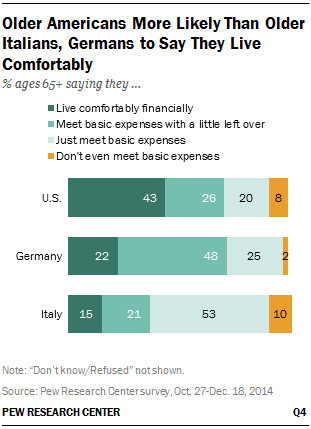 While the income levels of older Americans are, on average, comparable to that of older Germans and Italians, older Americans are somewhat more upbeat about their finances. When asked about their household financial situation, more than four-in-ten (43%) U.S. adults ages 65 and older say they live comfortably and an additional 26% say they meet their basic expenses with a little left for extras. One-in-five older Americans say they just meet their basic expenses, while 8% say they don’t even have enough to do that.
While the income levels of older Americans are, on average, comparable to that of older Germans and Italians, older Americans are somewhat more upbeat about their finances. When asked about their household financial situation, more than four-in-ten (43%) U.S. adults ages 65 and older say they live comfortably and an additional 26% say they meet their basic expenses with a little left for extras. One-in-five older Americans say they just meet their basic expenses, while 8% say they don’t even have enough to do that.
Among Germans ages 65 and older, the share who say they have at least a little left over after meeting basic expenses is comparable to that of Americans in the same age group (70% in Germany and 69% in the U.S.), but far fewer in Germany than in the U.S. say they live comfortably (22% vs. 43%).
In Italy, whose economy was especially hard-hit by the financial crisis, just 15% of adults ages 65 and older say they live comfortably, while 21% say the meet basic expenses with a little left over. More than half (53%) of older Italians report that they just meet basic expenses, and 10% say they don’t even do that.
Consistent with previous Pew Research analysis, which has shown a widening gap in wealth between older and younger adults in the U.S in recent years, the survey finds a significant gap in living standards reported by older and younger Americans. About four-in-ten (39%) Americans ages 50 to 64 say they live comfortably; among those ages 18 to 29 and 30 to 49, about three-in-ten say this is the case (31% in each age group). By contrast, in Germany and Italy similar percentages of older and younger adults say they are living comfortably.
Living Arrangements
At least nine-in-ten adults ages 65 and older in Germany (99%), Italy (94%) and the U.S. (92%) say they live in their own home or apartment, and the vast majority of those who live in their own homes say they do not have an aide, friend or family member providing care for them at home.13
Older Italians who live in their own homes are more likely than their American or German counterparts to say they have someone caring for them in their homes; 16% in Italy say this is the case compared with 8% in Germany and 5% in the U.S.
Among the 90% of Germans, 87% of Americans and 79% of Italians ages 65 and older who live in their own homes without anyone caring for them, about six-in-ten say that if there came a time when they could no longer maintain this living arrangement, they would prefer to stay in their own home with someone there to care for them than to make other arrangements. An additional 23% in Germany, 17% in the U.S. and 16% in Italy would prefer to move into an assisted living facility, while fewer say they would rather move in with a family member (6% in Germany, 8% in the U.S. and 3% in Italy) or into a nursing home (6%, 4% and 3%, respectively).
Advantages of Aging
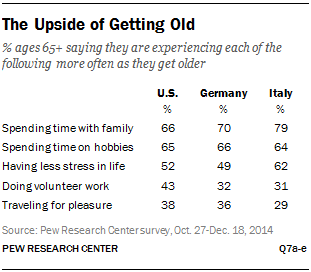 Across the three countries surveyed, majorities of respondents ages 65 and older say they are spending more time with their family and on hobbies as they get older. About eight-in-ten (79%) in Italy, seven-in-ten in Germany and 66% in the U.S. say they are spending more time with their family, and more than six-in-ten in each country say the same about the time spent on hobbies (64%, 66% and 65%, respectively).
Across the three countries surveyed, majorities of respondents ages 65 and older say they are spending more time with their family and on hobbies as they get older. About eight-in-ten (79%) in Italy, seven-in-ten in Germany and 66% in the U.S. say they are spending more time with their family, and more than six-in-ten in each country say the same about the time spent on hobbies (64%, 66% and 65%, respectively).
About six-in-ten (62%) Italians ages 65 and older also say they are less stressed as they get older, a sentiment shared by about half of Americans (52%) and Germans (49%) in the same age group. But fewer in each of the three countries say they are doing more volunteer work (43% in the U.S., 32% in Germany and 31% in Italy) or traveling more for pleasure (38%, 36% and 29%, respectively).
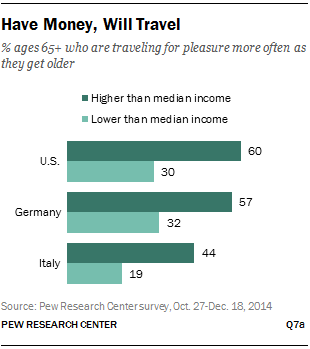 Perhaps not surprising, older Americans, Germans and Italians with higher incomes are about twice as likely as those with lower incomes to say they are traveling more for pleasure in their old age.14 In the U.S., 60% of Americans ages 65 and older with higher incomes are traveling more as they get older, compared with 30% of those with lower incomes. A similar pattern is evident in Germany and Italy: 57% of Germans and 44% of Italians ages 65 and older with higher incomes say they are traveling more for pleasure, while 32% of those with lower incomes in Germany and 19% in Italy say this is the case.
Perhaps not surprising, older Americans, Germans and Italians with higher incomes are about twice as likely as those with lower incomes to say they are traveling more for pleasure in their old age.14 In the U.S., 60% of Americans ages 65 and older with higher incomes are traveling more as they get older, compared with 30% of those with lower incomes. A similar pattern is evident in Germany and Italy: 57% of Germans and 44% of Italians ages 65 and older with higher incomes say they are traveling more for pleasure, while 32% of those with lower incomes in Germany and 19% in Italy say this is the case.
Challenges of Aging
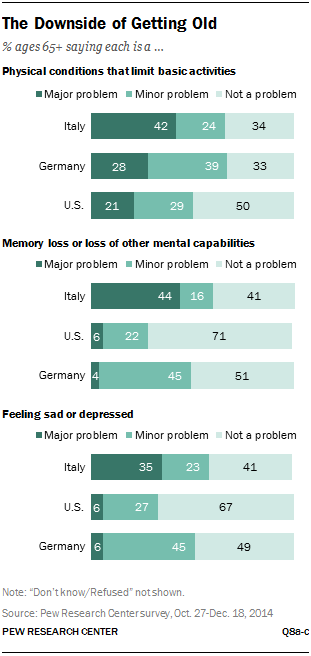 While many see advantages to getting old, aging is not without its challenges. The gap in experiences between older adults in Italy and those in the U.S. and Germany is particularly wide. Italians report much higher incidences of physical, mental and emotional problems.
While many see advantages to getting old, aging is not without its challenges. The gap in experiences between older adults in Italy and those in the U.S. and Germany is particularly wide. Italians report much higher incidences of physical, mental and emotional problems.
Some 42% of Italians ages 65 and older say physical conditions that limit their ability to do basic activities such as walking, climbing stairs and lifting things are a major problem for them, as do 28% in Germany and 21% in the U.S. And in all three countries, those who are 75 and older are more likely than those who are ages 65 to 74 to point to physical ailments as a major problem.
For example, 53% of Italians in the older age group say physical limitations are a major problem, compared with 37% of those ages 65 to 74. In Germany, 35% of respondents ages 75 and older report that this is a major challenge, while 21% of those ages 65 to 74 say the same; there is also a double-digit difference in the U.S. (28% vs. 16%).
In Italy, 44% of those ages 65 and older also say memory loss or loss of other mental capabilities is a major problem for them, and 35% say the same about feeling sad or depressed. Italians ages 65 to 74 are as likely to report these as major problems as are those ages 75 and older. In the U.S. and Germany, however, the percentage of respondents ages 65 and older who say memory loss or loss of other mental capabilities and sadness or depression are major problems is in the single digits.
Reliance on Help
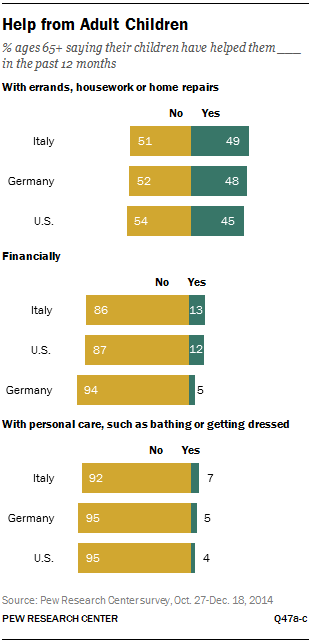 Large majorities of Italians (91%), Germans (87%) and Americans (83%) ages 65 and older say they don’t need help to handle their affairs or care for themselves. And among older adults who have a grown child, at least seven-in-ten say they get as much help as they need from their adult child or children (80% in Germany, 77% in the U.S. and 71% in Italy).
Large majorities of Italians (91%), Germans (87%) and Americans (83%) ages 65 and older say they don’t need help to handle their affairs or care for themselves. And among older adults who have a grown child, at least seven-in-ten say they get as much help as they need from their adult child or children (80% in Germany, 77% in the U.S. and 71% in Italy).
When asked specifically about different ways in which children might help aging parents, far more across the three countries say they have received help with errands, housework or home repairs than say the same about financial help or help with personal care, such as bathing or getting dressed.
In Italy and Germany, about half of respondents ages 65 and older say their children helped them with errands, housework or home repairs in the 12 months preceding the survey (49% and 48%, respectively); 45% of older Americans also received this type of help from their children.
German and American women ages 65 and older are more likely than their male counterparts to say their children have helped them with errands, housework or home repairs. About six-in-ten (62%) German women say this is the case, compared with 31% of older men in their country. In the U.S. 50% of women ages 65 and older say their children have helped them with errands, housework or home repairs in the previous 12 months, while 36% of American men in the same age groups say the same. There are no significant differences in the share of older men and women in Italy who report having received this type of help from their children.
In the U.S., older adults who are not married are more likely those who are married to say their children have helped them with errands, housework or home repairs in the preceding 12 months. About half (52%) of Americans ages 65 or older who are not married say their children have provided this type of help, while 37% of those who are married say the same.
Across the three countries, few respondents ages 65 and older say their children have helped them financially or with personal care. Just 13% in Italy, 12% in the U.S. and 5% in Germany say an adult child helped them financially in the previous 12 months, while 7% in Italy, 5% in Germany and 4% in the U.S. say their children have helped them with personal care.
 Still, while older adults in the U.S., Italy and Germany report that they are largely self-sufficient, and relatively few have received financial help or help with personal care from their children in the previous 12 months, some worry that they might someday become a burden to their children. In fact, more than six-in-ten (64%) older Italians worry this might happen, while a much smaller but sizable share of older Americans (29%) and Germans (25%) express similar concern.
Still, while older adults in the U.S., Italy and Germany report that they are largely self-sufficient, and relatively few have received financial help or help with personal care from their children in the previous 12 months, some worry that they might someday become a burden to their children. In fact, more than six-in-ten (64%) older Italians worry this might happen, while a much smaller but sizable share of older Americans (29%) and Germans (25%) express similar concern.
In Italy and Germany, older women are more likely than older men to say they worry they might become a burden to their children. Nearly three-quarters (73%) of Italian women ages 65 and older worry this might happen, compared with half of Italian men in the same age group. In Germany, older women are twice as likely as older men to say they sometimes worry they might become a burden to their children (32% vs. 16%).





